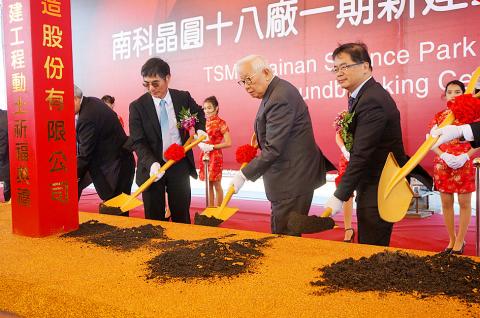Taiwan Semiconductor Manufacturing Co (TSMC, 台積電) yesterday held a groundbreaking ceremony for a NT$500 billion (US$17.18 billion) fab in Tainan, which it said would produce the world’s first 5-nanometer chips in 2020.
The Tainan fab is to be TSMC’s biggest manufacturing site, and the capital investment is expected to help extend the contract chipmaker’s technological lead, including in the 7-nanometer and 10-nanometer process technologies, over rivals such as Samsung Electronics Co.
TSMC, a major microprocessor supplier for Apple Inc’s iPhones, commands a 56 percent share of the world’s foundry market.

Photo: Huang Wen-yu, Taipei Times
The company said the investment shows its continuous pursuit of technological advancement by moving to the next technology node every two years based on Moore’s law.
“About seven or eight years ago, many global semiconductor companies stopped pushing forward their technologies. As of today, only three companies in the world continue to move forward with advanced technologies: TSMC is one of them,” TSMC chairman Morris Chang (張忠謀) said at the ceremony.
“This facility, called Fab 18, is to start volume production of 5-nanometer [chips] in two years. I have high expectations that this will be the world’s first 5-nanometer [chip plant],” Chang said. “Next comes 3-nanometer [technology]. We are confident that we will be able to produce 3-nanometer [chips] in three to four years.”
TSMC said it plans to utilize half of Fab 18’s space to build 3-nanometer production lines.
The new facility in the Southern Taiwan Science Park (南部科學工業園) will help fuel the company’s growth, Chang said.
As the company delivers a 15 percent to 20 percent ratio of return on invested capital, it could recover the NT$500 billion investment within five years, during which it might generate NT$1.5 trillion in revenue, he said.
TSMC aims to grow revenue at an annual pace of between 5 percent and 10 percent to 2021 in US dollar terms, he added.
Combined with NT$200 billion in research and development spending, TSMC said it would invest a total of NT$700 billion on the 5-nanometer process.
In the first phase of Fab 18’s development, volume production is scheduled to start in 2020 on 5-nanometer technology, two years after the firm ramps up 7-nanometer production next quarter, it said.
The second phase of development is to begin construction in the third quarter, with volume production starting in 2020, TSMC said, adding that the third phase is scheduled to start construction in the third quarter of next year, with the aim of launching volume production in 2021.
Once the three phases of construction are complete, the fab’s estimated annual capacity would exceed 1 million 12-inch wafers, creating 4,000 jobs, it said.
The science park is the biggest manufacturing site for TSMC, accounting for 40 percent of the company’s total revenue. Fab 14, which produces advanced 10-nanometer and 16-nanometer chips, is also based in the park.

Taiwan is projected to lose a working-age population of about 6.67 million people in two waves of retirement in the coming years, as the nation confronts accelerating demographic decline and a shortage of younger workers to take their place, the Ministry of the Interior said. Taiwan experienced its largest baby boom between 1958 and 1966, when the population grew by 3.78 million, followed by a second surge of 2.89 million between 1976 and 1982, ministry data showed. In 2023, the first of those baby boom generations — those born in the late 1950s and early 1960s — began to enter retirement, triggering

ECONOMIC BOOST: Should the more than 23 million people eligible for the NT$10,000 handouts spend them the same way as in 2023, GDP could rise 0.5 percent, an official said Universal cash handouts of NT$10,000 (US$330) are to be disbursed late next month at the earliest — including to permanent residents and foreign residents married to Taiwanese — pending legislative approval, the Ministry of Finance said yesterday. The Executive Yuan yesterday approved the Special Act for Strengthening Economic, Social and National Security Resilience in Response to International Circumstances (因應國際情勢強化經濟社會及民生國安韌性特別條例). The NT$550 billion special budget includes NT$236 billion for the cash handouts, plus an additional NT$20 billion set aside as reserve funds, expected to be used to support industries. Handouts might begin one month after the bill is promulgated and would be completed within

NO CHANGE: The TRA makes clear that the US does not consider the status of Taiwan to have been determined by WWII-era documents, a former AIT deputy director said The American Institute in Taiwan’s (AIT) comments that World War-II era documents do not determine Taiwan’s political status accurately conveyed the US’ stance, the US Department of State said. An AIT spokesperson on Saturday said that a Chinese official mischaracterized World War II-era documents as stating that Taiwan was ceded to the China. The remarks from the US’ de facto embassy in Taiwan drew criticism from the Ma Ying-jeou Foundation, whose director said the comments put Taiwan in danger. The Chinese-language United Daily News yesterday reported that a US State Department spokesperson confirmed the AIT’s position. They added that the US would continue to

IMPORTANT BACKER: China seeks to expel US influence from the Indo-Pacific region and supplant Washington as the global leader, MAC Minister Chiu Chui-cheng said China is preparing for war to seize Taiwan, Mainland Affairs Council (MAC) Minister Chiu Chui-cheng (邱垂正) said in Washington on Friday, warning that Taiwan’s fall would trigger a regional “domino effect” endangering US security. In a speech titled “Maintaining the Peaceful and Stable Status Quo Across the Taiwan Strait is in Line with the Shared Interests of Taiwan and the United States,” Chiu said Taiwan’s strategic importance is “closely tied” to US interests. Geopolitically, Taiwan sits in a “core position” in the first island chain — an arc stretching from Japan, through Taiwan and the Philippines, to Borneo, which is shared by